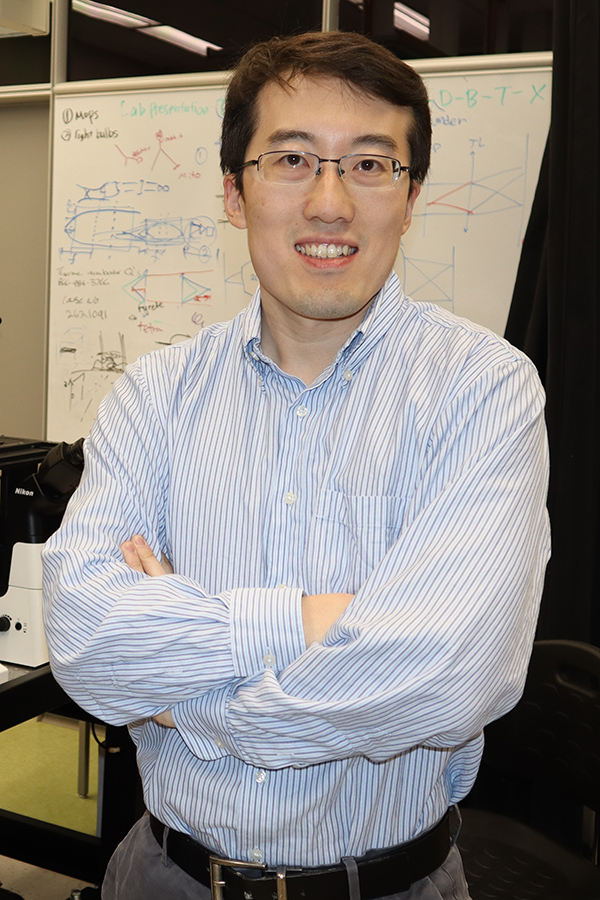Shu Jia wants to improve the tools we use to look at very small things. And his work is being acknowledged for its transformative impact.
The journal Biomedical Optics Express has just awarded a team led by Jia, whose lab develops new biomedical imaging technologies, the prize for the best paper published in the journal (for the years 2019-2021). It’s the first time the flagship journal of the Optical Society of America (OPTICA) has awarded such an honor.
Jia and his colleagues, co-first authors Haoyu Li and Changliang Guo, are being honored for their winning article, “Fast, volumetric live-cell imaging using high-resolution light-field microscopy,” which was published in 2019 and continues to influence other research teams.
“We’re thrilled to be recognized by the Society in this way,” said Jia, assistant professor in the Wallace H. Coulter Department of Biomedical Engineering at Georgia Tech and Emory University. “And we’re proud of this pioneering work – it has stimulated the emergence of other relevant techniques in this area of research since the paper’s publication.”
The paper reported a high-resolution light-field microscopy (HR-LFM) system for live-cell imaging with a resolution of 300-700 nanometers in all three dimensions, an imaging depth of several micrometers, and a volume acquisition time of milliseconds. The authors showed the feasibility of the technique by imaging various cellular dynamics and structures and tracking single particles.
“The work transforms conventional cell imaging that relies on scanning-based or epi-flourescence microscopy,” said Jia, whose co-authors were both postdocs in his lab at the time the research was published. Li is now an associate professor at Harbin Institute of Technology in China, and Guo is an associate investigator at the Institute of Molecular Medicine at Peking University.
Together with Jia, they demonstrated an imaging system that featured simplicity in instrumentation, low photodamage for time-lapse observations, and a high compatibility with various cell assays and imaging conditions.
“We anticipate our system to offer a promising paradigm for studying complex intracellular biomolecules, organelles and microenvironments that underlie diverse spatio-temporal regulations of cellular processes and functions,” Jia said.
The prize selection committee, which considered about 1,500 research papers, felt that the thoroughness of the Jia lab’s study, the clarity of presentation, and the significance of the work were particularly impressive. The certificate of award will be presented to Jia at the Optica Biophotonics Congress in Vancouver this April.
Latest BME News
Jo honored for his impact on science and mentorship
The department rises to the top in biomedical engineering programs for undergraduate education.
Commercialization program in Coulter BME announces project teams who will receive support to get their research to market.
Courses in the Wallace H. Coulter Department of Biomedical Engineering are being reformatted to incorporate AI and machine learning so students are prepared for a data-driven biotech sector.
Influenced by her mother's journey in engineering, Sriya Surapaneni hopes to inspire other young women in the field.
Coulter BME Professor Earns Tenure, Eyes Future of Innovation in Health and Medicine
The grant will fund the development of cutting-edge technology that could detect colorectal cancer through a simple breath test
The surgical support device landed Coulter BME its 4th consecutive win for the College of Engineering competition.








